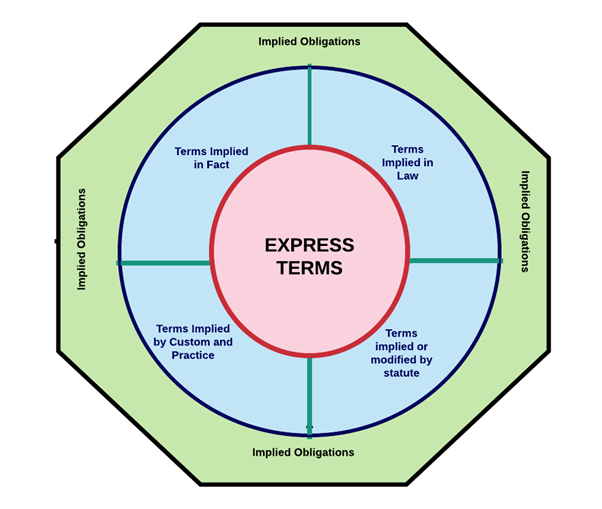Contract Terms
An employment contract is a document in which you and your employer agree on the work that you are going to do, how you will do it and when. Your employer agrees to pay you an amount of money in exchange for the agreed work. You have a number of rights given to you by statute, but the basic relationship between you and your employer is covered by the terms and conditions of the employment contract. Your contract can be made up of any or all of the following terms;
- Express terms
- Implied terms
- Imposed terms
- Incorporated terms
If your employer breaches any of these terms, you will have a breach of contract claim in the employment tribunal or court. This sort of claim is also called a wrongful dismissal claim. The first thing you should do if you are still in employment is to raise a grievance with your employer.
See Citizens Advice Contracts of employment ACAS Contracts of employment, Money Helper Employment Contracts; Your rights and key terms explained, Worksmart Pay and Contracts

Statement of Employment Particulars
There is no legal requirement for your employer to give you a written contract of employment, but they do have to provide a written statement of particulars of employment. S1 Employment Rights Act 1996 gives you the right to a written statement of terms and conditions of employment. This is called a Section 1 Statement. S3 Employment Rights Act 1996 says that the Section 1 Statement must contain the disciplinary and grievance rules and procedure which apply to your employment as well as providing the main terms and conditions of employment including;
- The name of your employer and your name
- The date the job started
- Your job title and duties
- Your place of work
- The rate and frequency of pay.
- Your hours of work
- Holidays, sick pay, pension scheme
- Notice
- Details of any incorporated collective agreements
Express Terms
These can be written down in the contract or spoken. A spoken agreement is as binding as one that is written down. It can apply even if you and your employer have not signed it. You may have a grievance because your employer is trying to change an express term of your contract or is not doing what is supposed to happen under the express term.
Implied Terms
These are terms which are not written down in the contract but are as much a part of the contract as if they were. They have been developed by the courts (known as the common law) and will be implied in circumstances where it is necessary to do so, or if the parties would have agreed to those terms after discussions.
Imposed Terms
These are terms that are imposed by the courts if they are a necessary part of a particular type of employment contract. The most important ones are the term of mutual trust and confidence, and the duty of fidelity.
- The term of mutual trust and confidence
- The duty of fidelity
- Statute
Incorporated Terms
Terms can also be incorporated from other documents such as staff handbooks, and collective agreements.
Last Updated: [11/09/2021]




